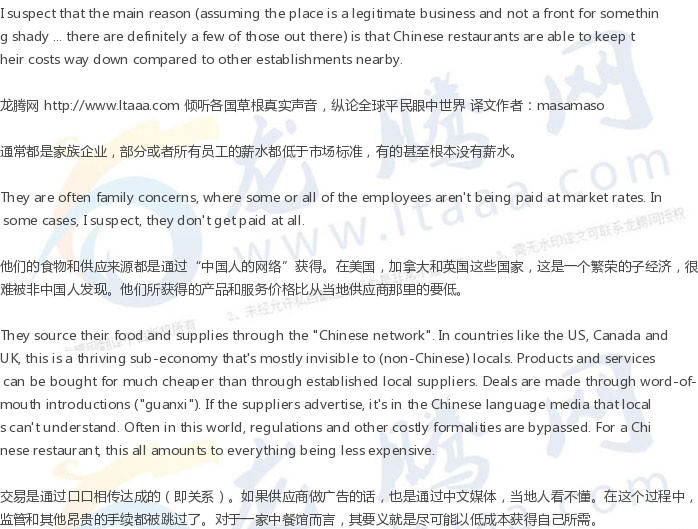为什么中餐馆在客人寥寥无几的情况下还能继续经营下去?(下) [美国媒体]
quora网友:总体上,从经济角度看,中国人的生意方式很不一样。通常美国人开店时,首先就是寻找资金。会去贷款或者把房子抵押。他们会建造“他们梦想中的餐馆”。找一个老的建筑,购买很多新设备,看起来极好......
How do some Chinese restaurants stay in business when there are hardly any customers?
为什么中餐馆在客人寥寥无几的情况下还能继续经营下去?(下)
Jon Baldwin, Reasonably Successful Entrepreneur
Updated Jul 9, 2016
Just a quick addition to Tom's post. In general, Chinese do things differently from a financial perspective.
总体上,从经济角度看,中国人的生意方式很不一样。
Often, when Americans start a business, the first thing they do is start looking for financing. They get deep into an SBA loan, line of credit, or take a second mortgage on the house.
通常美国人开店时,首先就是寻找资金。会去贷款或者把房子抵押。
Then they build "the restaurant of their dreams". Gutting the old establishment, buying lots of shiny new equipment, and making it "fabulous".
他们会建造“他们梦想中的餐馆”。找一个老的建筑,购买很多新设备,看起来极好。
All this leaves the restaurant cash poor, and with big loan payments and equipment leases to keep up with. If the unit doesn't produce right away, or some external force causes a setback, they're DONE.
...and if the family home is on the line, closing down sooner rather than later may mitigate the loses. This is an old statistic, but I think it's pretty common knowledge that 50% of restaurants go out of business within a year.
可是这种做法让餐馆没有了现金流,而且还要支付贷款和设备租金,一旦生意不好,或者外部因素导致挫折,那就完了。
Chinese in general aren't big on debt. So it's likely that the startup was bootstrapped from personal finances or along with input from extended family.
而中国人开店时不会欠下很多债务。所以开店用的都是个人资金,或者从家人那里借来的。
Used equipment and furnishings, "good enough" flooring, paint, and decor - all done by the owners themselves (or close contacts in the Asian community), and paid for in cash.
使用二手的设备和装饰品,差不多就行了,所有一切都自己干,或者顾熟人干,现金支付。
Johnathan Law
Answered Dec 15, 2013
In addition to Garrick's and David's answers, which are very good, I'd also like to add one more thing, regarding Chinese culture.
Chinese restaurateurs tend to take a different attitude towards their enterprises than Westerners. Many of them, not all, but many, are not really in it to make tons of money. Instead, they see it as simply a way to get by, stay close to home, and generally relax. The term for this is “过小日子”, which means to live a simple, comfortable life. You might notice that many Chinese restaurants, especially the smaller ones with slow business, are owned and run by middle-aged, older people. They open these businesses not to get rich, but just to get by on their own. Many of them a) might not have any other marketable skills, b) prefer to stay close to home and be available to their family, and c) don't like working for other people.
中国餐馆主对待自己企业的态度和西方人不一样。很多中餐馆主其实不是为了赚很多钱,而只是当作一种谋生的方式,离家近,以及放松的心态。他们叫做“过小日子”,即过简单舒适的生活。你会发现很多中餐馆特别是小型客流少的中餐馆,其运营者和所有者通常都是中年人或者老人。他们开店不是为了变富有,而是靠自己生活。他们中的很多人可能没有其他的赚钱技能,或者喜欢离家近点,和家人待一起,或者不喜欢为别人打工。
The other factor is rent. Garrick and David talked about labor and material costs, but neither of these, honestly, is as big a factor as rent. This is especially true if you're in the city. Since most Chinese restaurant operators aren't in it for the big money, they'll be located in low rent areas, possibly with very little foot traffic. Low rent means low pressure. Employees can be sacked, materials can be bought in smaller amounts, but rent is rent. A restaurant in an expensive area could go broke after just a couple months of poor business. In a less expensive area, it's easier to make up that difference either in sales or from your savings account. Case in point; the rent for my diner costs more than twice as much per month as payroll.
Chinese restaurants also rely on catering to private parties more. It's not uncommon for some businessmen to rent out the whole dining area for a night. This is also the ideal time to break out some...less than legal dishes/preparations.
另外一个因素就是租金。有劳动力和材料成本,但是最大的开销还是租金。特别是开在城市里的话。由于大部分的中餐馆运营者不是为了赚大钱,所以会在租金低的地方开店。租金低意味着压力低。雇员可以被解雇,材料可以少量购买,但是租金还是租金。而如果租金很高,几个月生意不好你就破产了。
中餐馆也更多的依赖私人派对。某些商人会把整个用餐区租下来一晚。
Tom Wills, Lifelong student of Chinese culture
Answered Dec 5, 2013
Referring here to Chinese restaurants outside of China.
我认为这是因为中餐馆把成本控制得非常低。
Chinese restaurants (especially the family-run variety) will often locate in lower-cost neighborhoods, allowing them to keep their rent payments down.
中餐馆(特别是家族经营的那种)通常位于资金低的社区,所以租金这块就大大减少了。
版权声明
我们致力于传递世界各地老百姓最真实、最直接、最详尽的对中国的看法
【版权与免责声明】如发现内容存在版权问题,烦请提供相关信息发邮件,
我们将及时沟通与处理。本站内容除非来源注明五毛网,否则均为网友转载,涉及言论、版权与本站无关。
本文仅代表作者观点,不代表本站立场。
本文来自网络,如有侵权及时联系本网站。
图文文章RECOMMEND
热门文章HOT NEWS
-
1
Why do most people who have a positive view of China have been to ...
- 2
- 3
- 4
- 5
- 6
- 7
- 8
- 9
- 10
推荐文章HOT NEWS
-
1
Why do most people who have a positive view of China have been to ...
- 2
- 3
- 4
- 5
- 6
- 7
- 8
- 9
- 10












